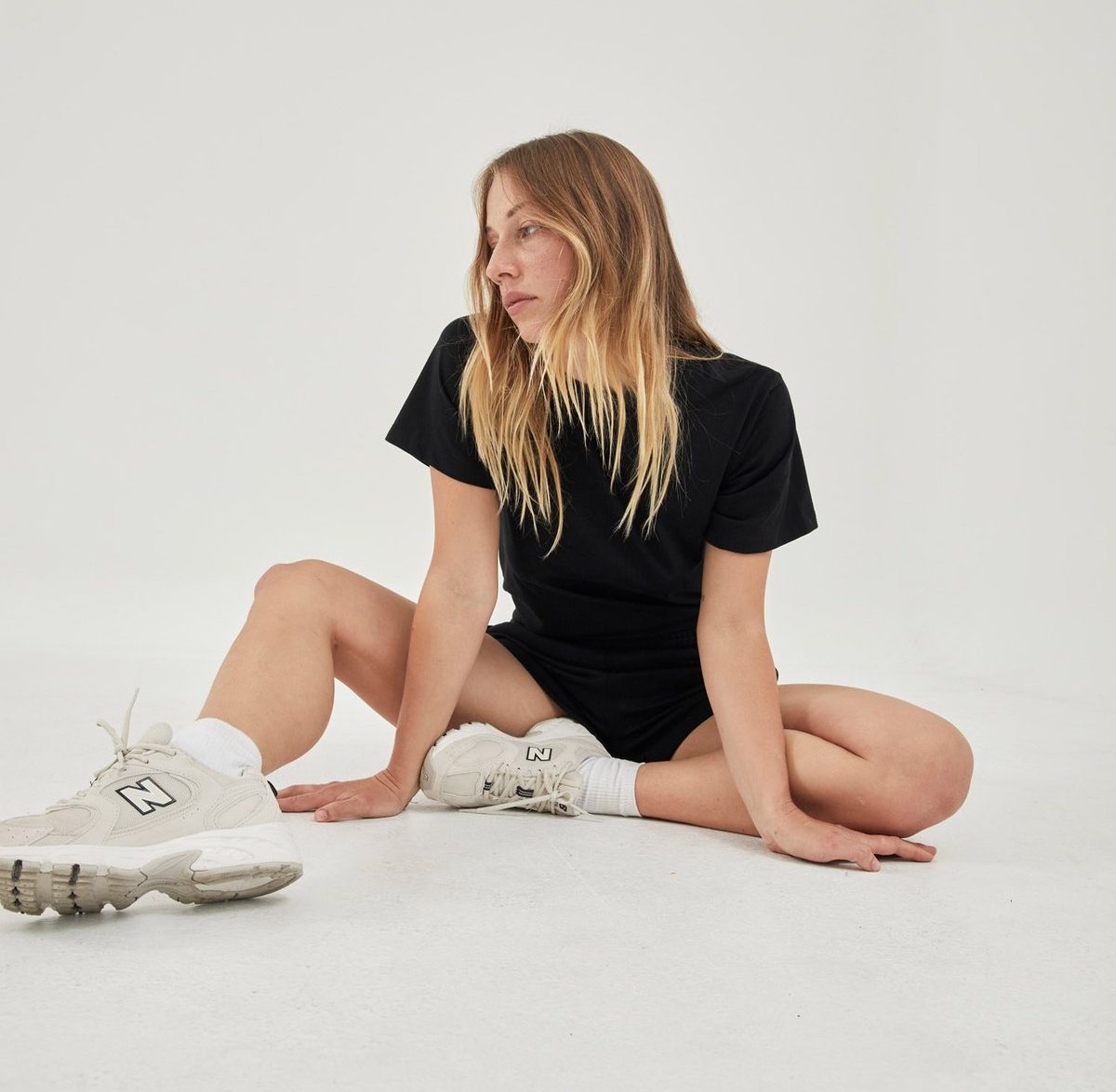
Fashion /
Admittedly, I’ve never been one to get truly excited about buying joggers or sweatshirts – until 2020 that is, when my favourite polka-dot dresses, slim jeans and cornflower blue blazer found a new home at the back of my wardrobe. As more time indoors went by, the need to replace my (already overachieving) old comfies cropped up, and that’s when I discovered the rules of buying sweats were exactly the same as buying a new blouse. Each purchase still needs to be considered and loved. They should be made from conscious, soft materials and laundered kindly, not discarded because of the occasional coffee spill. Most importantly, like any fashion purchase, your new sweats should make you feel good, and that’s where ‘joungewear’ comes into play. Joyful loungewear could mean serotonin-boosting colours or cheery symbols that instantly lift your spirits, supporting female-founded sustainable brands, or guilt-free options that have been ethically crafted with circularity in mind.
In need of a little more inspiration? Take a look through the green-thinking roundup below and remember that you’ll be forgiven for later wearing your sweatpants with real shoes out of the house.
Take it from someone who has pretty much lived in her hoodie and sweatpants since they arrived, the joyfulness of Maggie Marilyn’s Somewhere Sport pieces comes in twofold: firstly, they are so exceptionally soft and comfy thanks to the carefully selected neutral fabrics and the considered fits – the slim joggers are snug around the butt and have elasticated cuffs which tapers them a little, while the hoodie is oversized and slouchy without feeling swampy. Secondly, they’re fully traceable, meaning you can wear them knowing that they’ve been made responsibly from farm to finish. Mindful materials are a big factor here; the organic cotton fibres support organic agriculture, which prohibits the use of synthetic toxic pesticides and fertilizers as well as genetically engineered seeds, while using significantly less water. Not only is organic agriculture better for the environment, but it also protects the livelihoods of farmers and their local communities. Further to this, founder Maggie Hewitt and her team are working closely with their suppliers to encourage the implementation of regenerative agriculture processes. It’s fair to say that it’s been quite the year for Maggie Marilyn, which recently announced its switch to DTC from majority wholesale and an extended size range. “Our purpose is to use fashion to create a better world,” says Hewitt, who seems to be on exactly the right track.
The impossibly stylish duo behind ROTATE Birger Christensen, Thora Valdimars and Jeanette Friis Madsen, decided on the name ROTATE because it evokes the cyclical nature of those wardrobe favourites that you wear on repeat. What’s more, their signature dresses have become major hits on fashion rental apps and platforms like By Rotation. Now, the former COSTUME staffers have released their most environmentally responsible capsule yet: ROTATE Sunday. Created using 100% recycled materials and certified organic cotton, it blends the relaxed, easy mood of weekends with the label’s bold, sexy energy. Think of it this way: if ROTATE is all about partying in puff sleeves, Sunday is there for the day after, when cosiness and comfort are top priorities. It’s the use of mood-boosting colours that turns it from loungewear to ‘joungewear’, like the flame set debuted by Jeanette during Copenhagen Fashion Week and the candy pink sweatshirt Emili Sindlev wore while getting her makeup done for Dancing with the Stars. Plus, the silhouettes are perfectly oversized, thanks to the Creative Directors who workshopped the fits.
“We are of the opinion that if we can do it better, and kinder, we will,” says Ninety Percent. Concerned with the past, present and future of the clothes, it works with industry-leading factories to ensure responsible production, while its team continuously searches for considered fabrics to create with. On top of those two very important things, the label is called Ninety Percent because it shares 90% of its distributed profits between charitable causes and those who make the collections happen – you can even vote for your chosen cause using the unique code on the garment’s care label, which sparks such a warm feeling inside. Added joyfulness here comes from the satisfying number of places that you’ll be able to get away with wearing sweatpants and tanks, thanks to the stylish fabrics and great fits. The stark contrast of the two-tone joggers makes you instantly feel a bit cooler and the tartan set is equally as perfect for lounging in as it for grabbing brunch with your girlfriends.
A feeling of joyfulness with MATE’s loungewear can be derived from knowing that you’re supporting a female-founded company that’s predominately operated by women. Launched by Kayti O’Connell Carr, the “clean essentials” brand gives a damn by creating each collection using non-toxic, natural or organic materials. Its supply chain is localised in LA (ten miles to be exact,) where each piece is cut, sewn, dyed, packaged and shipped in recycled boxes. Whether you’re working from home or curling up on the sofa with a good book, join #TeamDressClean with one of the brand’s TENCEL sleep sets – not only is the fabric is so soft your skin will thank you for it, but the sweeping necklines and elasticated waistbands ensure maximum comfort. These shade of these organic cotton terry sweats are the perfect match to Goop’s ginger and turmeric latte, too.
Though it doesn’t identify as a fully sustainable brand, GANNI is working hard to deliver more responsible fashion collections, particularly through an exploration of quality materials that are better for the planet and your wardrobe. Certain to put a smile on your face, its cheery edit of organic cotton T-shirts are printed with uplifting slogans and a reminder to recycle. You could team yours with the brand’s EcoLife® sweatpants. A certified yarn, EcoLife® is made from 50% post-consumer recycled polyester (such as PET plastic bottles) and 50% pre-consumer recycled cotton from end-of-line manufacturing ‘scraps’ which would otherwise have gone to waste.